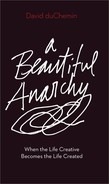AN ACT OF CREATIVITY
This book began as a book about the creative process. And because the creative process is what it is, and part of that is it’s reliable unpredictability, the book is becoming something else, something bigger, as I write it: a book about life as creative process. In part that has happened accidentally.
The more I’ve written—a chapter here or there—the more I’ve found unexpected connections between things I didn’t initially see. The biggest connection has been the way the principles of an intentionally nurtured creative process mirror those of a life lived intentionally and creatively. So while I started out to write a book about the creative life, I’ve written something much more about the created life, which is fitting because the more I discuss creativity with others the more I see it touching every aspect of our lives, in every discipline, and if it can so permeate our lives I think it deserves a conversation that is larger than just how being creative relates to the life of the artist.
The creative process, in broad terms, is relatively predictable. We know something of how it works and we know that it works, in part because the human brain is just so truly good at what it does when it’s all working as it should. But being able to rely on it doesn’t remotely mean that we know exactly where it’s going to take us. There are too many authors, musicians, or inventors who testify to the fact that the muse has dragged them into unexpected places, to ignore the serendipitous nature of the creative journey. If the creative process is predictable in broad strokes, it’s wildly unpredictable in the details. But that doesn’t mean we can’t be as intentional about the life we’re creating as we are about the work that fills our days.
Being intentional begins with a difficult question for most of us, difficult because we seem to have learned not to ask it. That question, asked in several different ways, is simply this: What do I want? What do I want to create? What kind of person do I want to become? What kind of people do I want to be surrounded by? What kind of legacy do I want to leave? And, conversely, what do I not want? For most of us it just seems easier to let life come as it does, to react to what comes, and one day find our lives have formed themselves into an ad hoc collection of all the decisions we chose not to make, all the ways we settled for things we never wanted. We find our house has been built of the flotsam and jetsam that’s washed up on the beach and been banged together over the years, more from reaction to what’s come our way than from an effort to build something specific.
I’m not sure if it’s because we don’t trust ourselves to be both ambitious and generous, but we’ve come to equate ambitious people with people who hunger for power. Ambition is a fuel and the machine it powers can be used for good or evil. But it’s not the fault of ambition when people choose to aspire to less than noble things.
It takes great ambition to do the things of which Mother Teresa or Gandhi were capable. It takes focused intent to dedicate your days to perfecting a heart implant or the discovery of a cure for cancer, but those are not the only efforts to which ambition is nobly applied. It takes ambition to do your art, to write your book, to raise your children to be everything you hope for them. And yes, it takes ambition and some difficult honesty to admit that what you want is to make an astonishing amount of money in order to do astonishing things that cost money. Someone has to pay for cancer research. It’s easy for artists to say they don’t think about these things, but try being broke or on the edge of bankruptcy and you’ll see that you think about money much, much more than you ever imagined.
Being hungry and dodging creditors as you pursue your art is not noble, nor is it likely (necessarily) to lead to great art. Of course, money is not the point here. Desire it or don’t, but you can’t ignore it because too many good, beautiful, world-changing things come at a cost and unless you find someone willing to cure cancer or teach your children by bartering for a chicken or a goat, cash will be preferred, because they too have bills to pay. If you want it, money or otherwise, it’ll be easier to come by if you’re honest and intentional about making it. Sure, people discover things by accident, but for the most part even those accidental discoveries were made while they were intentionally looking for something. Search for nothing and you’re bound to find it. Strive for nothing, hope for nothing, and desire nothing, and there’s a better chance than not that you’ll get exactly what you strive for, hope for, and desire: nothing.
This is not the same sermon as the one that starts with “If you can dream it, you really can do it.” A wonderful notion, but not one based in any reality I’m familiar with. I’ve failed at plenty of things I’ve been able to dream of. But I’m not sure I’d have known one way or the other for certain unless I tried. Anyone who hopes to spend any time doing anything creative will become more familiar than they’d like to be with the reality that this, whatever this is at the time, just might not work. But it sure as hell won’t work if you don’t try.
